- Home
- Tamora Pierce
Emperor Mage Page 2
Emperor Mage Read online
Page 2
They knew she was right. Birds took flight by groups, careful not to bump into one another; dogs and cats left the docks. Only the rats stayed, their attitude of decided unwelcome a steady itch in her mind.
Piffle to you, she told them, and went to join Numair at the rail. He was dressed simply, but well, for their arrival. His soft, wavy black hair was tied in a short horsetail, accenting a long nose and full, sensitive mouth. A black silk robe that buttoned high on the throat billowed around his powerful frame. Long, wide sleeves covered his arms to the wrists; the hem stopped short of the toes of his boots. That robe was donned by only a handful of mages, the most powerful in the world. Not even the famed Emperor Mage was allowed to wear it. Numair always played it down. He said the learning needed to win the black robe was not worth much in the real world, but Daine knew better. Once, when Numair was pressed by an enemy sorcerer, she saw him turn the other man into a tree.
“Are you all right?” she asked, squinting up at him. The effort strained her neck: he was a foot taller than her five feet five inches. His dark eyes were emotionless as he watched the dock. Only his big hands, white-knuckled as they gripped the rail, showed tension. She had wanted to talk about the badger’s visit, but she could see that this was not a good time. “Is something wrong?”
“No, magelet,” he said, using his private name for her. “And I am as well as may be expected. I can’t say which prospect makes me more apprehensive—that of meeting old enemies, or old friends.” His voice was unusually somber.
“Old enemies, surely?” She understood his concern. Carthak’s great university had been his home for eleven years. Shortly before his twenty-first birthday he had fled, accused of treason against his best friend—the emperor. Now, almost thirty, he was, in a way, coming home.
“I don’t know,” was his quiet reply. “I was very different then. And you know what the wise men say—‘Only birds can return to old nests.’” He shook his head, and smiled down at her, white teeth flashing against his swarthy face. “Mithros bless. You look very pretty.”
Kitten chortled while Daine blushed. “You think so really?” she asked, feeling shy. “I know I don’t hold a candle to Alanna, or the queen—”
He held up a hand. “That isn’t strictly accurate. The Lioness is one of my dearest friends, but she is not an exemplar of female beauty. Years and experience have given her charm, and her eyes are extraordinary, but she is not beautiful. Queen Thayet is astoundingly attractive, it’s true, but you have your own—something.” He scrutinized her as she giggled. “You should wear blue more often. It brings out matching shades in your eyes.”
“I heard that about my looks,” Lady Alanna said, joining them. “I’ll get you later.” Like Daine, she wore a tunic and breeches. Hers were violet silk trimmed with gold braid, over a white silk shirt. At her waist hung her sword. She grinned at Daine. “You do look good.”
“Thanks,” Daine said, blushing once more. “So do you.”
The others, clad in daytime finery, joined them now that the ship was about to dock. Under their conversation, Daine tugged Numair’s sleeve. “I need to talk to you as soon as you can manage,” she whispered as the sailors made the ship fast. “It’s really, really important.”
He nodded, but his eyes were on the ships around them. She couldn’t be sure he’d even heard.
Across the harbor a gong crashed three times. The Carthakis on the docks knelt and touched their heads to the ground as slow, regular drumbeats sounded. A path had opened from their ship across the busy harbor to what appeared to be a canal lock. Down that path came a high-prowed boat rowed by shaved-headed slaves. Its gilded surfaces threw off painful flashes as it swept along.
Daine peered at the man seated on a thronelike chair on the deck. He wore a crown like a cap, one covered with diamonds, that glittered fiercely. “Who is that?”
Gareth the Younger said, “Probably a lesser prince, one of the imperial court.”
“This prince isn’t a lesser one.” Numair’s stage whisper carried to those behind him. “See the lapis lazuli rod in his left hand? That is an attribute of the heir—what’s his name?”
“His nephew Kaddar,” one of the others said. “Age sixteen. Studies at the university.”
The Tortallans got into the ship’s boat and were rowed to the galley, where a heavy ladder was dropped to them. Daine waited for the senior members of her party to board, then followed. Kitten lost patience with her slow progress up the ladder and scrambled up past her, beating her onto the deck. Their order, as they gathered before the prince, was roughly that of importance, with Duke Gareth, Lord Martin, and Lady Alanna in front, Numair and the other officials behind them. Gareth the Younger, Daine, Kitten and the Tortallan clerks kept to the back.
Someone called orders. A drummer sounded a beat. Sunburned and tanned backs on Daine’s left stretched forward. The left bank of oars dipped; the boat began to turn.
Standing by the prince was a herald. He wore a gold robe cut like those Daine had already seen on other Carthakis, a knee-length tunic with short sleeves. Thumping his staff of office on the deck, he cried, “His Imperial Highness, Kaddar Gazanoi Iliniat, Head of House Khazoi, Prince of Siraj—”
Daine lost track of the rest. She was interested in the boat: once it had turned, both sets of oars rose and fell on drumbeats, and the vessel raced across the harbor. On either side of the deck the rowers sat at their benches. Each time they stretched forward or pulled back, she heard a clatter under the drum’s thud and the men’s grunts of effort. It took her a moment to realize that it was the noise of the chain that linked their ankle cuffs.
Her skin prickled. She made herself look away and listen to the herald. “—His Most Serene and Imperial Majesty, Ozorne Muhassin Tasikhe, Emperor of Carthak—”
Kitten went to the end of a bench, chirping and peering at the man seated there. The girl went after her. “I’m sorry,” she told the man, who watched the dragon from the corner of his eye. “She doesn’t know not to interrupt when folk are working—” The slave looked up at her, startled.
“Eyes to your oar!” snarled a voice nearby. A lash snaked out to flick the man on the cheek. The slave hardly blinked, though the whip had come dangerously close to his eye. Daine bit the inside of her cheek and went back to her place, hoisting Kitten onto her hip.
Someone passed a handkerchief to her as the herald began to name their company to the prince. She quickly wiped her eyes. By the time she was under control, Gareth the Younger and the dean of mages at the Tortallan royal university were bowing to the prince, who greeted them both with distant courtesy. They bowed again, and stepped to the side so that Daine and Kitten were revealed.
Awed, the girl saw that the odd shape of the prince’s eyes came from dark lines drawn on both lids and extended to his temples. He was a light-skinned black, with thin lips and long, thick eyelashes, dressed in a calf-length tunic of crimson silk. His jewels shimmered in the sun. He boasted three gold rings in his left ear, a gold bangle shaped like a many-flamed sun, and a ruby drop in the right. Another ruby served him as a nose button. He wore a collar-like necklace of gold inlaid with mother-of-pearl strips. Rings decorated fingers and thumbs; bracelets hung on both wrists. A flash drew her eyes to his feet, where she found rings on toes bared by his sandals. It occurred to her that she might not possess as much jewelry in her entire lifetime as the prince wore right now.
“Veralidaine Sarrasri,” the herald proclaimed. “The dragon Skysong.”
“I greet you in the name of my august kinsman, the Emperor Mage of Carthak,” the prince said formally. Then he leaned forward, eyes sparkling with interest. “It’s a true dragon?” His voice was light and fast. “Not a basilisk, which we’ve seen, but maybe a young basilisk—”
Kitten walked to the raised chair and rose, balancing on her hindquarters as she gazed at the young man. “She’s a true dragon, Your Highness,” replied Daine. She saw intelligence in his eyes, paint or no. “Basilisks have pebb
led skin, almost like beading. Kit—her name’s Skysong, but mostly folk call her Kitten—she has scales. Her ma was the same.”
The prince frowned. “A mother? We were told there is only one dragon in the mortal realms.”
“There is. Her ma was killed by—” She almost said “Carthaki raiders,” but stopped herself. As she had been told over and over, no one could prove they were Carthaki. “Pirates,” she went on. “She gave birth to Kitten a week before she died, and I’ve been raising Kit ever since.”
“Is it hard? What does she eat? Does she hunt live prey, or—”
The herald coughed. “Your Highness, the ambassadors have yet to greet the delegation.”
The prince looked like any of Daine’s Rider friends caught in a misstep. He made a noise that sounded like a sigh and eased back in his chair, holding the blue stone rod and gold fan crossed on his chest once more. “It is my hope that, should you have idle hours during your stay with us, you will permit me to show you some of Carthak’s wonders.”
Duke Gareth had told her such an offer would be made by a Carthaki noble, so Daine had an answer ready. She bowed. “I’d be honored, Your Highness,” she said, while thinking, He sounds so thrilled.
“May I present you of Tortall to your colleagues and fellow ambassadors,” intoned the herald, more as a command than a request. He led their group to the spot where men, some dressed like the prince, some in robes cut in the same fashion as Numair’s, waited under a canopy. Most of their names escaped Daine, at the rear of the Tortallan delegation. She would have to deal with almost none of these dignitaries, and saw no reason to memorize alien names and titles.
Once, a mage, did make an impression. He was a different fish among so many black-, brown-, and olive-skinned southerners—a tall northerner, tan and weathered from sun and wind, with earnest blue eyes and silver streaks in his flyaway blond hair. He stood with lesser mages and nobles, wearing a scarlet robe with earth-brown cuffs and hem. He wore his robe unfastened, over a northern-style shirt and breeches made of undyed cotton. When the herald gave his name—Lindhall Reed—he and Numair embraced. Daine smiled. Ever since she had met Numair two years ago, she had heard much of his old teaching master.
“Arram,” Lindhall said, using Numair’s birth name, “welcome, if that is the proper word.”
Numair’s eyes were overbright. “I’m surprised you remembered our arrival,” he replied, voice scratchy. “I thought I’d have to root you out of your workroom.”
“No, no.” Reed’s voice was quiet, cultured, and fast, as if he fought to breathe. “I have a good assistant, better than you were. She keeps track of everything. Unfortunately, she’s about to go live with the merfolk and study their culture. I hear they’re moving in all along the Tortallan coast. I’d thought they’d live in rookeries, like sea lions, but their nature appears to be more tribal. And you are Arram’s student,” he said without a break, looking at Daine. She jumped at the change of topic. “He wrote me so much about you. He says you know how bats avoid objects and catch prey. When I was a student I incurred censure when I hypothesized that they do it with manipulation of sound, and Arram said you proved that to be true.”
Daine smiled up at this man, who was nearly as tall as Numair. “Well, yes. They squeak at things. Their ears move separately, to gather in what they hear, and each sound has a meaning—”
“I don’t like to interrupt,” Numair said apologetically, “but, Lindhall, I have questions that require answers. Forgive me, both of you.”
Lindhall looked wistfully at Daine. After friendship with Numair, she recognized someone who would rather talk about learning than anything else. “Duty calls,” the older mage commented. “And I know we shall have other chances to confer, since you are here for the emperor’s birds, and I help him to care for them. Very well, Arram, I am yours, for the time being. Unless—” His face brightened. “I know you’ve always had encounters with whales. It is true, their songs are communication, not merely noise? Or communication in the sense of birdcalls, proclaiming territory, and so forth? I—”
“Lindhall,” Numair said firmly, and dragged his old friend away.
I didn’t even get to ask him what’s wrong with the emperor’s birds, Daine thought, and sighed.
“Daine,” called Alanna, “can you spare Kitten? Duke Etiakret and Master Chioké would like a closer look at her, if she doesn’t mind.”
Kitten whistled an inquiry to Daine, who smiled. “Go on. They want to admire you.” Kitten, always open to admiration, galloped off.
Trying not to look at the slave rowers, Daine went to the prow of the boat, where she could see the riverbank. During the introductions, they had left the port city of Thak’s Gate behind, following canals that led finally into the River Zekoi. As the oars tugged the barge south, the city on Daine’s side of the boat gave up its claims to the riverbank.
An army replaced it. From here she saw barracks in long rows, taking up hundreds of acres. Companies of soldiers stood side by side on the riverbank, each soldier with a bright, rectangular shield on one arm, a spear in the opposite hand. Looking at them, she swallowed hard. She was no stranger to military camps. Since her arrival in Tortall she had visited home bases for the army and the Queen’s Riders alike, but none of them were as big as this.
As the imperial vessel passed the first company of soldiers, Daine heard a shouted order. As one man, the soldiers banged their spears three times on their shields, then thrust the spears into the air with a roar. The second company followed suit, then the third, then the fourth. It seemed to go on forever, drowning out all conversation and making Daine’s ears ring. Duke Gareth is right, she thought, feeling ill. Even if we could beat so many, what would be left afterward?
The gods are up to something, she remembered abruptly. Something that might put a crimp in the style of this army. If only I could find out what’s going to happen!
“That is just the Army of the North.” The prince joined her at the rail as they sailed past the last soldiers. “My uncle has three other armies of identical size, all in combat readiness.”
It was hard to read his face, but he sounded as if he wasn’t proud of the imperial forces. “What’s over here?” she asked, turning. They now had a good view of the far bank also. This side of the Zekoi was untamed. Reeds grew head-high; a web of streams emptied into the river. The loglike shapes on the far bank were not dead wood, she realized, but animals.
“Crocodiles.” The prince had seen what she looked at. “Do you have them in the north?”
“No,” she replied, calling with her magic. They stirred, drunk with the sun. “They’re giant lizards, aren’t they? I have a book that tells of them.” She called again, and felt a soft reply.
“Giant, water-swimming, vicious lizards,” replied the prince.
Daine counted to three, then said politely, “There’s few animals that’re ‘vicious’ by nature, if you’ll forgive my saying so. Usually there’s a good reason for them acting nasty—like you’re stepping in their nests, or you’re stealing their food.”
Food, agreed a low voice in her mind. Hungry, commented another. A third voice added, Waiting for food.
“Like all females, you are sentimental about animals,” the prince replied, his tone superior. “If you had a croc after you in the water, you wouldn’t be so quick to stand up for them.”
“They came after you personally?” She couldn’t see this painted fellow doing anything that might wrinkle his clothes.
“Well, no, but everyone says they do.”
Someday I must read this scholar Everyone, she thought as she bit her tongue to keep from giving a rude answer. He seems to have written so much—all of it wrong.
She called to the crocodiles again. I’m Daine, she told the great creatures. I come from the north.
You are odd, replied the one who had spoken last. You smell of frozen water and too many trees. Do not scold that two-legger. If he enters our water, we will eat him gladly.
“If you can’t hold on to pets, you don’t deserve to have any,” scolded the slave. The child screamed as she dragged him away without another look at the animal in the river. The crocodiles did not share her disinterest. They slid into the water from their riverbank.
“No, don’t!” Daine cried to them aloud, forgetting her companion. “Let it be!”
Hungry, said a voice. Food is food.
It will die anyway, replied the one who spoke most. Look at it.
The crocodile was right. The tiny creature, whatever it was, couldn’t swim. It fought to stay up, but the current dragged on its fur and limbs.
Stripping off her boots, Daine jumped over the rail and into the river. Swimming against the current, she struck out for the drowning animal. Please stop, she told the crocodiles silently. It isn’t more than a mouthful! One last pump of her arms, and she had reached the sufferer.
I hope you do not interfere in too many meals, remarked the talkative crocodile as the reptiles swam off. We do not have enough food as it is.
I’ll try not to, Daine promised. Treading water, she pumped liquid from the pet’s lungs. He gasped. “Shh,” she said. “It’s all right. I’ve got you.” He was a monkey, tiny enough to sit on her palm, with huge gray-green eyes. Around his neck was a jeweled collar. “No wonder you couldn’t swim.” She unbuckled the thing and let it fall. “That was probably too heavy dry, let alone wet.”
Black, sparkling fire yanked them from the river and pulled them through the air. Daine soothed the frantic monkey until Numair’s magic deposited them on the deck of the imperial barge.

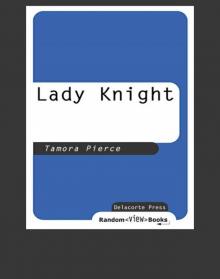 Lady Knight
Lady Knight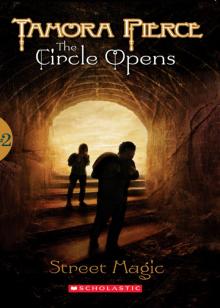 Street Magic
Street Magic Bloodhound
Bloodhound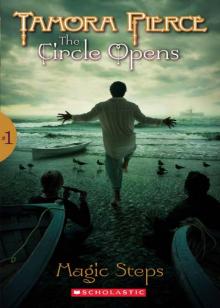 Magic Steps
Magic Steps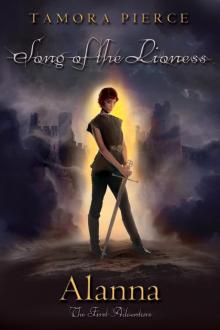 Alanna: The First Adventure
Alanna: The First Adventure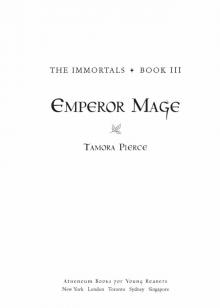 Emperor Mage
Emperor Mage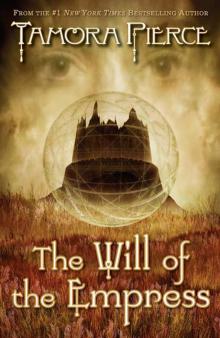 The Will of the Empress
The Will of the Empress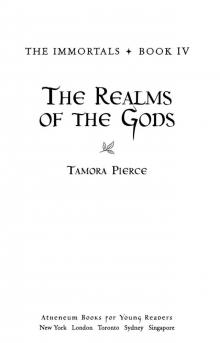 The Realms of the Gods
The Realms of the Gods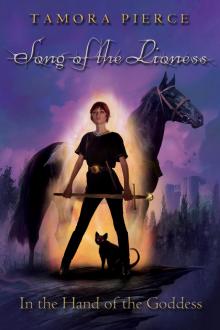 In the Hand of the Goddess
In the Hand of the Goddess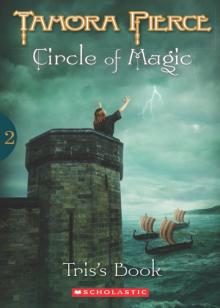 Tris's Book
Tris's Book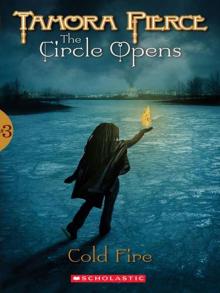 Cold Fire
Cold Fire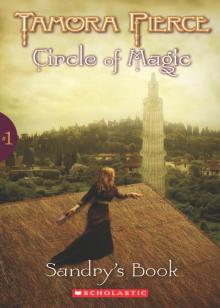 Sandry's Book
Sandry's Book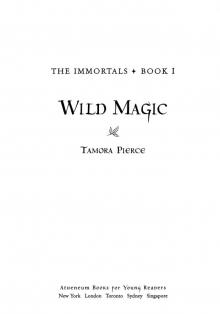 Wild Magic
Wild Magic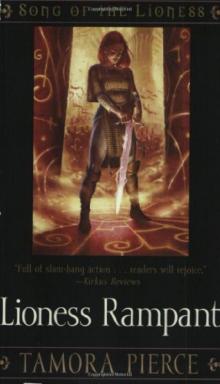 Lioness Rampant
Lioness Rampant The Woman Who Rides Like a Man
The Woman Who Rides Like a Man First Test
First Test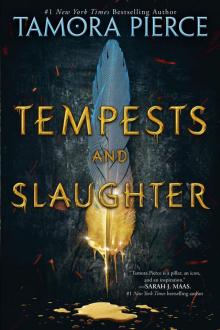 Tempests and Slaughter
Tempests and Slaughter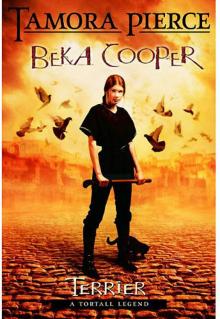 Terrier
Terrier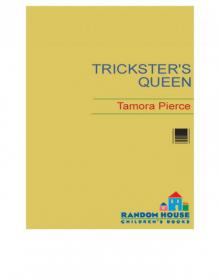 Trickster's Queen
Trickster's Queen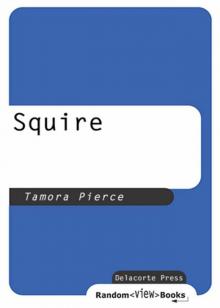 Squire
Squire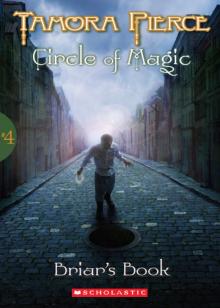 Briar's Book
Briar's Book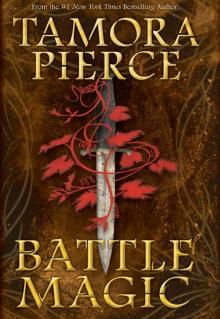 Battle Magic
Battle Magic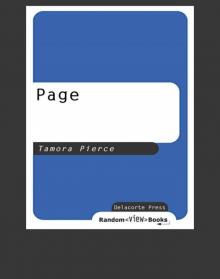 Page
Page Melting Stones
Melting Stones Wolf-Speaker
Wolf-Speaker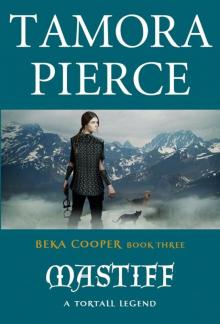 Mastiff
Mastiff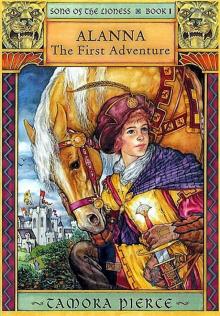 The Song Of The Lioness Quartet #1 - Alanna - The First Adventure
The Song Of The Lioness Quartet #1 - Alanna - The First Adventure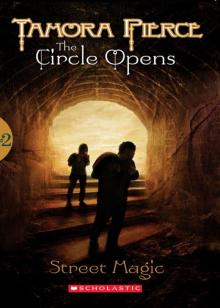 The Circle Opens #2: Street Magic: Street Magic - Reissue
The Circle Opens #2: Street Magic: Street Magic - Reissue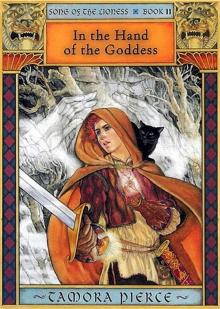 Tortall 1 - Song Of The Lioness #2 - In The Hand of the Goddess
Tortall 1 - Song Of The Lioness #2 - In The Hand of the Goddess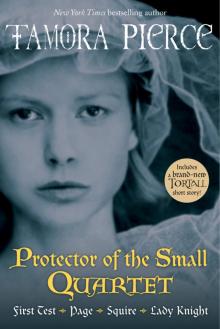 Protector of the Small Quartet
Protector of the Small Quartet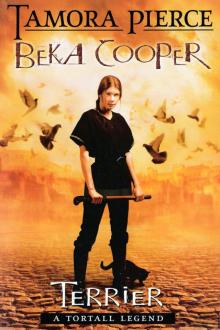 Beka Cooper 1 - Terrier
Beka Cooper 1 - Terrier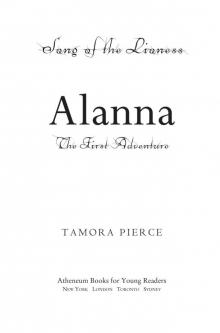 Alanna
Alanna Trickster's Choice
Trickster's Choice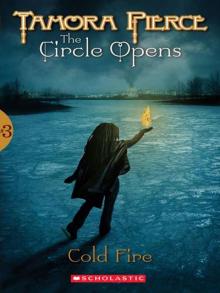 Circle Opens #03: Cold Fire
Circle Opens #03: Cold Fire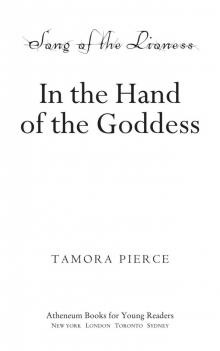 In the Hand of the Goddess (The Song of the Lioness)
In the Hand of the Goddess (The Song of the Lioness)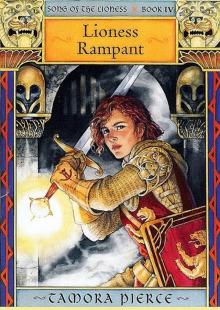 Song of the Lioness #4 - Lioness Rampant
Song of the Lioness #4 - Lioness Rampant Young Warriors
Young Warriors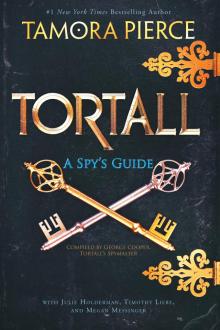 Tortall
Tortall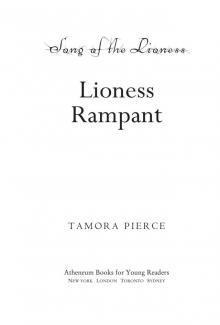 Lioness Rampant (Song of the Lioness)
Lioness Rampant (Song of the Lioness) Melting Stones (Circle Reforged)
Melting Stones (Circle Reforged)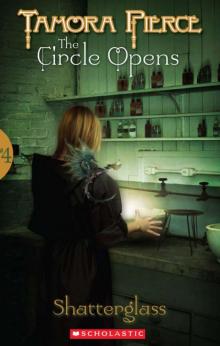 The Circle Opens #4: Shatterglass
The Circle Opens #4: Shatterglass